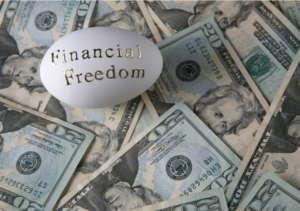Interview with Krista McLellan
In this episode, we will uncover 3 keys to:
- Unlock Women’s Financial Potential through Financial Control
- Don’t delay, tackle financial challenges head-on to build confidence and wealth.
- Join forces with fellow women, share knowledge, and unlock financial freedom together.

Podcast Transcription
Episode 5: Krista W. McLellan – A Published Author and QuickBooks Online Expert Empowering Women and Business Owners in Financial Mastery and Business Growth!
Intro
Odiva Vasell: (00:00)
Hello, all you fabulous fempreneurs. Welcome. Today, we have a very special treat for you. Today, we are here with Krista McLellen, and she is a woman who helps other women get comfortable with the F word, and so we are going to let her tell you more about herself and tell you exactly how she does that. Welcome, welcome Krista.
Unlock Women’s Financial Potential through Financial Control

Krista McLellan: (00:33)
Thank you so much for having me. Yes, I caught the F word, the other F word: finances, and that actually came from my grandfather. He ran a trucking company, so yes, I learned to curse like a truck driver from a young age, and he said to me one time (I was very little), and he slipped a truck driver’s word curse, and he said, “Notice, they have no problem dropping that word, but they have a hard time coming to talk to me about their paycheck.”
Odiva Vasell: (01:06)
Wow.
Krista McLellan: (01:08)
And so, as I have been a bookkeeper, and I help small businesses, and one of the hardest things that they have to do is to talk about their money. All I could think of is my grandfather said it right, and it was, “We really need to get comfortable talking about our money, healing some of our money trauma, our history, so that we can rewrite that story and then be able to understand it so that we can take control. Because if we don’t understand, how can we take control? And once we take control, we’re on the path to freedom.”
Odiva Vasell: (01:46)
Wow, that’s beautiful, Krista. And, oh, you hit home on so many points. Talking about our finances can be like a trauma, and it’s passed down from generation to generation. I’ve seen that in my own family. And it’s sad that we cannot talk to each other about money unless it’s in a negative way. How do you start the process of the conversation? I’m guessing you’ve already done that in your family. How do you start the process of the conversation about finances with people who are just blocked?
Krista McLellan: (02:30)
Well, it started in my family when my first husband got sick with cancer. He was diagnosed with cancer and passed away within a year of being diagnosed. And that really caused a huge upheaval in my life financially because I had a little hobby that brought in a little extra money. Now all of a sudden, I was the sole support for my two small children. There was nothing else coming in but what I made. So it started with having conversations with my children. They were nine and twelve at the time, teaching them that if we don’t track it, it slips through our fingers so quickly. So it’s not just about the value of a dollar, but tracking it and being intentional with it gives us more power over it. Time and money should both be spent on paper first. Know where you want it to go. Where do you want to spend it? Because if you don’t tell it what to do, it just disappears.
Odiva Vasell: (03:42)
If you don’t tell it what to do, it just disappears.
Krista McLellan: (03:46)
Yes, I started with my children, and I took those same lessons that I gave my children. Now, I grew up with a single mom, and I used to resent her very frugal living. But boy, did those lessons come back and be a huge help for me because I put them in place. My children and I made decisions together, and I took those lessons that we learned and also translated them to my business owners. Because I was just doing bookkeeping, right? All bookkeeping is, is tracking. Where did it come from, and where did it go to? Well, I decided to up that and not just be a bookkeeper but help the business owner really understand and be intentional with their money, be able to understand those financial reports, and use them to grow their cash flow and to put more money back in their pocket.
Odiva Vasell: (04:42)
Oh, my goodness. I know so many business owners that are going through their business like this. See no evil. And it comes from the conditioning. Maybe I’m not good at math, or I don’t understand this process, I’ll just leave it to someone else. I know that I came from the upbringing of saving every penny, but saving every penny and not really knowing how to spend it and when to spend it and just taking the responsibility of making that decision. Okay, this is what I want. So as you said, it would just go away. Someone will make that decision for you. It’s better that it’s you.
Don’t delay, tackle financial challenges head-on to build confidence and wealth.

Krista McLellan: (05:32)
Yes, and that is my passion. My passion is empowering other businesswomen. I love to work with women. I say that because, and I do work with men too, but men tend to, when they start a business, they typically have a wife at home who’s running their house, taking care of their kids. They hire the accountant, they hire the marketer, they hire whoever. When women start a business, we’re still running our house. We’re still running our kids. We’re still doing the cooking and the cleaning. We’re putting on the taxi driver hat, the nurse hat, the marketing hat. We just keep switching hats, and we keep juggling it all. So typically, a man is not afraid to go out and get that loan, whereas a woman is going to make do with whatever she has. I empower women with the knowledge to be able to do it themselves, to be able to make the most of that money and build that solid financial foundation. Knowing, okay, should I be a DBA? A sole prop? An LLC? An S corp? A C corp? What’s the difference? What’s the difference between a profit and loss and a balance sheet and a statement? What is all this? What’s an audit trail? What’s an expense audit? What’s a reconciliation? Always know these terms. So to be able to use it in everyday language and show them you do know, you actually know more than you think you do. And we’re just going to put that knowledge to work, and we’re going to up your skill set, and you’re going to rock your business money like a boss.
Odiva Vasell: (07:08)
Wow, rock your business money like a boss. That’s a beautiful sentiment. And does it take years for someone to start to change their mindset and change their sentiment? Oh, no. Okay, tell me more.
 Krista McLellan: (07:28)
Krista McLellan: (07:28)
I will say that I work with some women that have some money trauma to heal, and I named my business Money Making Mamas for a reason. Because if you say, “I’m a Money Making Mama,” for some people, that lands funny, it feels weird, right? It’s not comfortable to say. Well, there’s your cue that you have some money trauma to heal, and we need to dive in and work on that, because if you’re not comfortable with money, how is it going to come to you? You have a block up. You’re putting that wall up for receiving and growing. So we need to heal it so that you can receive more, grow it. Because the more empowered we are, the more money is. We as women are the ones who open more small businesses than men do. And if we can get, but we don’t attain the same financial freedom that men do. And I want us to get that financial freedom because we as women are more philanthropic, and we have the more money we make, the bigger voice, stronger voice, louder voice we have.
Odiva Vasell: (08:32)
A rising tide carries all ships. Yeah. I love that beautiful sentiment. And the world is starting to wake up to this. I recently watched a documentary about how many women, as you say, are opening up small businesses, and that money that flows into us helps families in a good way. It helps communities grow. It’s just not a one-off wealthy person writes a check and sends it and doesn’t know where it goes to. This is really helping us locally. It impacts everybody. I say that when you employ one local person, you’re feeding at least five families. And we can multiply that by so much more. It’s a beautiful thing. Yeah.
Krista McLellan: (09:35)
It really is. Women do business in a different way. We’re much more emotional about it. You’ll notice when a man goes and gives a proposal, and he’s just looking at the job, giving the proposal, right. A woman will go and she’ll look at the job, and she’ll be like, “Okay, but I can see that money might be tight.” And she’ll give a discount, and then she’ll start the job without taking some money first. And she almost devalues herself because her heart is feeling the vulnerability and the tough situation that the other person might be in. And it’s a double-edged sword. It’s our power, but it’s also a weakness. It’s our vulnerability. It’s definitely a double-edged sword. It makes us so much more compassionate and so much more involved with our clients. But we also tend to shortchange ourselves financially when we do that.
Odiva Vasell: (10:31)
And I’ve been in Masterminds and surrounded by lots of women entrepreneurs. And I found sometimes when we were talking about money, I remember going into a Mastermind, and I said, “Okay, if you could do one thing that would, you know, give you $1,000 or $10,000 right now, you could do one thing in your business that would just. You’d be really motivated to do it, and it would give you $10,000 immediately, what would it be?” And they just went, “I’m not motivated by money. No, I don’t even think about that.” And I thought, “You’re in business, and you’re not interested in money. You’re not really in business.”
Krista McLellan: (11:26)
Money is the lifeblood of your business, and if you don’t keep your finger on the pulse and keep that pulse going, then disaster is right around the corner.
Odiva Vasell: (11:35)
Yeah. I mean, even a charity, okay, let’s say you’re philanthropic and you’re just doing this because you want to save the world. But even a charity needs money. They know that they’re running businesses, and it’s really hard. I’ve watched women again. I’ve talked to women about pricing their businesses and sales, and they’ll go into a sales call and just completely shrink, shrink, shrink to, “Okay, how much can you offer me?” And if they’re dealing with a male client, he knows what price he wanted to pay. He had that mindset, and women aren’t operating in that mindset of control or, “I know what I want, and I’m valuing myself at this rate.” Now, women are learning that. But it wasn’t always that way.
Join forces with fellow women, share knowledge, and unlock financial freedom together.

Krista McLellan: (12:40)
Well, I say to women, we’re not taking time away from our families to be a volunteer in our own nonprofit. We are in business to make money. If you want to stay in business, you have to make money. And sales does not equal profit. If you don’t know the difference between sales and profit, you need to work with me, because just because you have more sales does not mean you’re making more money. And we can really take that wealth that we’re creating to do so much good in the world. And if we don’t have it, we’re limited in what we can do.
Odiva Vasell: (13:22)
Can you say that? That was so fantastic. Can you just repeat that again? And I really want this to sink home to our listeners.
With greater wealth comes a greater ability for women to positively impact and uplift their communities, big or small.
Krista McLellan: (13:31)
That once we create wealth and we get wealth, the amount of good that we can do grows with the amount of wealth we have. If we only have $10, what can we do to help that homeless person on the street? What can we do to help a sister who’s struggling? And if we have $10 million, we can do so much more and be more effective, whether it’s helping more people or helping fewer people in a bigger way. And to me, I would love to be in a position to empower other women to help their sisters.
Odiva Vasell: (14:11)
And I just love the idea of financial freedom. I’ve looked at the patriarchy, the history of the patriarchy, and I see how things were designed so that women were making less so that they would make fewer of the decisions. And now there’s this new wave of entrepreneurs, as I say, fempreneurs who are making their own money. And in fact, they were already there. Like, many of us had mothers who saved and worked part-time jobs. They were doing it, but not on their own terms. So now we’re kind of able to do it on our own terms. We have technology to help us reach clients and bring in that money. But being able to manage that. As you said, sales does not equal profit.
Krista McLellan: (15:15)
It doesn’t. And this is where a lot of times when I go in and I’m looking at a business and they need help, well, first, we’re going to deal with the books, right? And then a lot of what I see in the books will tell me a story of how I can help that business owner. And as I work with that business owner, yes, we’re going to look at your books, but we’re going to look at more than your books. We’re going to help you delve into understanding how to price. We’re going to delve into understanding why you might not be comfortable charging or asking. I’ve seen women do the work and not invoice. Asking to be paid is hard. And we feel greedy. We feel guilty. I want to change that because, again, we can do so much good in this world. In the United States, it’s been a very short time that women have been able to make their own financial decisions, which is why we have a lot of catch-up to do. We couldn’t own a business. We couldn’t own a house. We couldn’t have a credit card. We couldn’t have our own bank account. It was my mother’s time. We’re only two generations out right now, my mother and us. My grandmother couldn’t own a house or have her own bank account. So we are playing catch-up big time. And it’s exciting. It’s exciting because women are pulling together, and we’re leaning on each other, and we’re emulating for each other, and we’re being resources for each other. And women collaborate beautifully together.
Odiva Vasell: (16:54)
And you’re just speaking into the thing that I’m most passionate about, the community of women helping each other and moving away from knocking on some guy’s doors, putting on a suit and heels and asking him to pay me. Essentially, we are bringing our own resources to the table. Not always money, but our minds, our passion, our hearts, our ways of thinking and supporting each other. And you have such a phenomenal perspective, and this business that you do is really helping women get to the next level. I really believe that finances are the key to success in any business. And yeah, tell me more about that.
Financial independence is your financial superpower.
Krista McLellan: (17:50)
It is. And I didn’t realize how much I, when Scott and I were married, I gave away a lot of my power, and he handled those finances. And I always thought I wasn’t good at math. I’m not good at that. And he handled it all. And then we did separate, and I was just getting on my feet and figuring it all out. When he was diagnosed, and his sickness did not last long, it was ten months, and I realized the mortgage was in his name, to his bank account, to his phone, right? I mean, my name was there, but it all went to his contact information, everything. All the power I had given away that made it so I had to let my electricity get shut off so I could open up a new account. What was I doing? And here I am, a bookkeeper, right? But I had put off doing my taxes because I was afraid of owing and what I would owe. And I put it off and I put it off and I put it off because after he died, we didn’t have extra money. So I kept putting it off because I was afraid of what I was going to owe and where I was going to pull it from. And then push came to shove, and my oldest was applying to college, and she came in. I remember it so vividly. And I was cooking at the stove, and she said, “Mommy, I can’t apply to school.” And I said, “What are you talking about? You have busted your butt. You are top of your class.” She goes, “No, Mom, I can’t fill out the FAFSA, which is the financial form that your taxes are tied to. Taxes I hadn’t done yet, right?” So all of a sudden, my stomach my stomach hurt. And I was just like, “I’m failing. My children deserve… I deserve better.” Yeah. And so I kind of took a deep breath and I steadied myself, and I turned and I looked at her, and I said, “Baby girl, I’m going to take care of this. Don’t you worry. We got this.” And so here I was, I did it. I got my taxes done. And here’s… If I had bothered to do my taxes on time, I would have got money back. That’s the kicker of it all. I would have money I missed out on because I put my head in the sand instead of facing it.
Odiva Vasell: (20:21)
Oh, yeah. Head in the sand.
Krista McLellan: (20:22)
What I find more often as I work with business owners is that they’re actually missing out on money because they’re putting their head in the sand.
Odiva Vasell:(20:30)
Oh, yeah.
Taking on money problems head-on gives you control and brings peace of mind.
 Krista McLellan: (20:31)
Krista McLellan: (20:31)
And if we can face it, then that money can flow better. And all of a sudden now, instead of having the stagnation and anxiety and sleepless nights and stress, money is flowing. You know where it’s coming? You know where it’s going? You have more say and more control to pull the levers to make more profit or slow down on the expenses and decide. Oh, really? Wow. I spent that much on Dunkin’s. Oh, I think I want to spend that much on Dunkin’s or unused subscriptions or what? You have more power and more say, which gets that money flowing, which helps our peace of mind, gives us better sleep, makes us feel more confident, and it changes us. It changes how we do business.
Odiva Vasell: (21:21)
Oh, my goodness. Thank you. You’re changing lives, and women need to learn how to get into the flow. I love that word. Money should flow like water through you, to you, from you, never grasping or holding on and choking off the flow because you’re not only choking off the flow for it going out, you’re choking off the flow for it going in. And what you said, they were like ostriches putting their heads in their sand and don’t want to see it because of fear.
Krista McLellan: (21:55)
And I think that part of my passion is because I can relate. I’ve been in a bad situation. I’ve had to dig myself out. I’ve had to hide my car from the repo man, right? So there’s nothing that women can say to me that’s going to ruffle me because there’s no judgment, there’s no shame, there’s no blame. We all are where we are, and the only way is to move forward.
Odiva Vasell: (22:24)
Yes. Thank you, Krista, for joining me today and dropping some, I like to say, nuggets of wisdom. No, these are huge boulders of wisdom.
Krista McLellan: (22:39)
F bombs.
Odiva Vasell: (22:44)
We dropped some f bombs today. Lady, hear this word. Your finances are the key to so many areas of your future. And you just want to kick out that f word, fear, and move into this f word or flow.
Krista McLellan: (23:03)
And freedom. Financial freedom. We want to be fierce.
Odiva Vasell: (23:10)
Yes, fierce. Oh, lots of F words coming on. So thank you for joining me today. And this is lovely. This is just lovely. And I’m already, okay, I’m just going to invite you back again because we need to hear more of this.
Krista McLellan: (23:28)
Well, thank you for having me. You’re an absolute joy. I’m glad we’ve connected.
[music]
Conclusion
In a world where financial freedom was once a distant dream, we’ve discovered inspiring stories of women breaking barriers. With Krista Whitman McLellan as our guide, we’ve learned that financial freedom is achievable through determination and knowledge. Now it’s your turn to take control of your financial destiny. Remember, it’s not just a destination—it’s a mindset. So, embark on your journey, rewrite the rules, and break boundaries on your road to financial freedom. The adventure awaits!